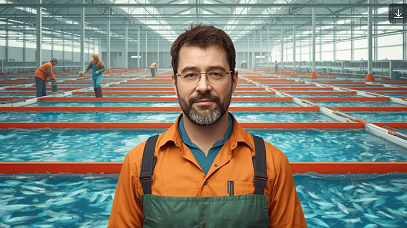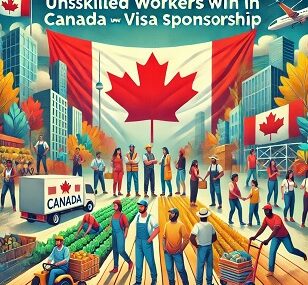Fish Plant Worker Jobs in Canada with Free Visa Sponsorship 2025/2026
Introduction
Canada is one of the largest fishing nations in the world, thanks to its vast coastline along the Atlantic and Pacific Oceans, as well as the abundance of freshwater lakes and rivers. The seafood processing industry covering fish plants, seafood packaging facilities, and aquaculture operations generates billions of dollars in exports annually.
However, despite the industry’s size, Canadian employers face a major labor shortage in fish processing plants. These jobs are often physically demanding, seasonal, and located in rural communities, making it difficult to attract local workers. As a result, Canadian employers are turning to foreign workers through visa sponsorship programs to fill vacancies in 2025/2026.
For job seekers from Nigeria, Ghana, Kenya, India, the Philippines, and other countries, fish plant worker jobs in Canada with free visa sponsorship represent one of the best opportunities to work, earn in Canadian dollars, and even transition into Permanent Residency (PR).
This guide covers everything you need to know: visa options, eligibility, requirements, application process, salary expectations, employer list, and step-by-step pathways to settle in Canada permanently.
Why Canada Needs Fish Plant Workers
The demand for fish plant workers is driven by several key factors:
-
Global Seafood Market: Canada exports seafood to over 130 countries, generating over CAD $8 billion annually.
-
Labor Shortage: Remote locations discourage local Canadians from working in fish plants.
-
Aging Workforce: Many current employees are nearing retirement age.
-
Seasonal Demand: Peak fishing seasons create urgent labor needs.
To sustain this vital industry, employers are actively recruiting foreign workers through visa sponsorship programs, especially under the Temporary Foreign Worker Program (TFWP) and the Atlantic Immigration Program (AIP).
Fish Plant Worker Jobs in Canada with Free Visa Sponsorship 2025/2026
What is a Fish Plant Worker Job?
Fish plant workers are responsible for processing seafood products before they are distributed to markets, restaurants, or exported.
Typical Job Titles
-
Fish Plant Worker
-
Seafood Processor
-
Fish Packer
-
Fish Cutter/Trimmer
-
Cannery Worker
-
Seafood Production Worker
Duties & Responsibilities
Fish plant worker jobs are hands-on and require stamina. Common responsibilities include:
-
Cleaning, gutting, and cutting fish
-
Removing bones and scales
-
Sorting and grading seafood by size/quality
-
Operating machinery for freezing, canning, or packaging
-
Loading and unloading seafood shipments
-
Maintaining hygiene and safety standards in the plant
-
Assisting in fish quality inspections
Salary & Benefits
The salary for fish plant workers in Canada depends on the province, employer, and work arrangement (seasonal or full-time).
-
Hourly Wage: CAD $15 – $21/hour
-
Weekly Salary: CAD $600 – $840
-
Annual Salary: CAD $30,000 – $40,000
Additional Benefits
-
Free or subsidized accommodation (common in rural plants)
-
Transportation allowance
-
Overtime pay after 40 hours/week
-
Free visa sponsorship under employer-backed programs
-
Healthcare coverage provided by employers in some cases
Visa Sponsorship Options
1. Temporary Foreign Worker Program (TFWP – Low-Wage Stream)
-
Most common route for fish plant workers.
-
Employer applies for Labour Market Impact Assessment (LMIA).
-
If approved, you get a work permit with visa sponsorship.
2. Atlantic Immigration Program (AIP)
-
Covers Nova Scotia, New Brunswick, Prince Edward Island, and Newfoundland & Labrador.
-
Employers can directly hire foreign workers without LMIA in some cases.
-
Provides pathway to Permanent Residency.
Fish Plant Worker Jobs in Canada with Free Visa Sponsorship 2025/2026
3. Agri-Food Pilot (Limited Cases)
-
Though focused on meat & mushroom processing, some seafood roles may qualify.
4. Provincial Nominee Programs (PNPs)
-
Provinces nominate fish plant workers for PR if they have a job offer.
Eligibility & Requirements
To qualify for fish plant worker jobs in Canada with free visa sponsorship:
General Requirements
-
Age: 18–50 years preferred
-
Education: Minimum high school (though not always required)
-
Experience: Prior seafood/fish handling experience is an advantage but not compulsory
-
Language: Basic English/French
-
Health: Must pass medical examination
-
Police Clearance: Required
-
Job Offer: Must have an LMIA-backed offer from a Canadian employer
Documents Required
-
International passport
-
Job offer letter & LMIA (if applicable)
-
Educational certificates (if available)
-
Updated CV/Resume tailored to fish processing
-
Police clearance certificate
-
Medical examination results
Step-by-Step Application Process
Step 1: Search for Fish Plant Jobs
Top sites include:
-
Canada Job Bank
-
Indeed Canada
-
Glassdoor Canada
-
Provincial job portals (Nova Scotia, Newfoundland & Labrador, PEI)
Step 2: Apply to Employers
Send CV and cover letter emphasizing physical stamina, teamwork, and willingness to relocate.
Step 3: Employer Applies for LMIA
The employer proves no Canadian is available for the role.
Step 4: Receive Job Offer & Contract
You will receive an official employment contract with visa sponsorship.
Step 5: Apply for Work Permit
Submit documents to Immigration, Refugees, and Citizenship Canada (IRCC).
Step 6: Travel & Start Work in Canada
Upon approval, you can begin working legally as a fish plant worker.
Top Provinces for Fish Plant Jobs
-
Newfoundland & Labrador – Canada’s largest fish processing hub.
-
Nova Scotia – Major seafood exporter.
-
New Brunswick – Home to large fish processing companies.
-
Prince Edward Island (PEI) – Known for mussel and seafood plants.
-
British Columbia – Salmon and shellfish processing.
Top Employers Hiring Foreign Workers
-
Ocean Choice International (Newfoundland & Labrador)
-
Clearwater Seafoods (Nova Scotia)
-
Cooke Aquaculture (New Brunswick)
-
Royal Greenland Seafood (Atlantic Canada)
-
High Liner Foods (Nova Scotia)
-
St. Mary’s River Smokehouses (Nova Scotia)
Permanent Residency Pathways
Fish plant workers can transition from temporary workers to permanent residents through:
-
Atlantic Immigration Program (AIP) – After gaining work experience.
-
Provincial Nominee Programs (PNPs) – Provinces nominate skilled/semi-skilled workers.
-
Agri-Food Pilot (if eligible) – Limited seafood roles qualify.
-
Canadian Experience Class (CEC) – After 1 year of Canadian work experience.
Fish Plant Worker Jobs in Canada with Free Visa Sponsorship 2025/2026
Opportunities & Challenges
Opportunities
-
No degree required
-
Free visa sponsorship available
-
High demand in rural Canada
-
Pathway to PR & citizenship
Challenges
-
Physically demanding work
-
Jobs located in remote/rural towns
-
Seasonal nature of some roles
-
Cold working environments in fish plants
Testimonials
Chukwu, Nigerian Worker in Newfoundland:
“I came in 2024 as a fish plant worker. The work was tough at first, but the pay was good, and my employer helped me apply for permanent residency through the Atlantic Immigration Program.”
Maria, Worker from the Philippines:
“Fish processing is not easy, but Canada is full of opportunities. My contract included free accommodation, and I’m saving money to bring my family.”
FAQs
Q1: Do I need IELTS to work as a fish plant worker in Canada?
No, IELTS is not required for temporary work permits. However, PR applications may require proof of language.
Q2: What is the salary for fish plant workers in Canada?
Between CAD $30,000 – $40,000 annually.
Q3: Can Nigerians and Africans apply for fish plant jobs?
Yes, employers actively recruit from Nigeria, Ghana, and other African countries.
Q4: Is accommodation provided?
Yes, many employers provide free or low-cost housing.
Q5: Can I bring my family?
Yes, some programs allow open work permits for spouses and study permits for children.
Conclusion
Fish plant worker jobs in Canada with free visa sponsorship 2025/2026 are one of the most accessible opportunities for foreigners seeking employment in Canada. With no degree required, free visa support, competitive salaries, and pathways to permanent residency, this is an excellent option for those ready to work in Canada’s thriving seafood industry.
From Atlantic Canada to British Columbia, fish processing plants are opening their doors to international workers. If you are physically fit, hardworking, and eager to start a new life, this could be your golden ticket to Canada in 2025/2026.






